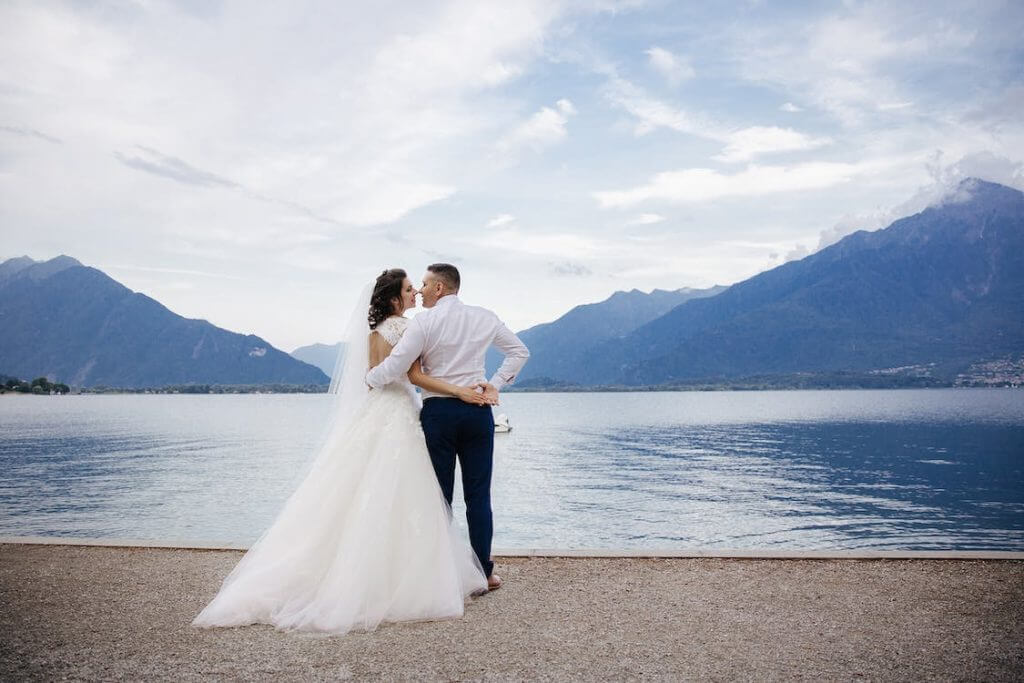A good day-of coordinator will be YOUR advocate. They know when it’s okay to break the rules and help you create a day that feels like you.
Ask your coordinator how available they will be to you in the weeks leading up to your wedding. Giada always calls vendors the evening before to confirm their access and set-up times.
Don’t Forget About The Ceremony
If you are having a ceremony or religious event, it is very important that your day of coordinator knows about these. They will be responsible for ensuring that your officiant is ready to go and that your guests are positioned properly to see the ceremony. They will also be responsible for cuing your photographer and letting them know when key moments are coming up so that they can get in the best position to capture these memories.
When interviewing potential day of coordinators, ask about the times where their plans had to shift on a wedding. Listen closely to how they talk about these situations and how they were able to quickly reorder things without causing a major headache for the couple or their vendors. This is a good indication of their ability to think on their feet and to handle the unexpected.
It is also very important to make sure your day of coordinator is aware of any special needs you may have for your ceremony, such as gluten-free options, religious restrictions, or physical limitations. They will need to be able to communicate these clearly with your officiant and any other vendors that are involved in the ceremony. They should also have a clear idea of who will be speaking at your ceremony, and should have a way to easily pass this information along to the musicians (or DJ) so that they are prepared.
Lastly, it is very important that your day of planner stays in contact with you throughout the planning process. This can be done through emails, phone calls, or in-person meetings. Make sure that they will be available to answer questions or address any concerns you have. If they don’t want to meet with you or are constantly putting you off, it is probably time to move on to someone else.
Finally, be sure that your day of coordinator is willing to work with your photographer. They should be able to give them a copy of the timeline and will need to know what shots are most important to you. They should also be able to provide the photographers with information about when they can expect to hear certain music, so that they are prepared.
Don’t Forget About The Reception
A day of coordinator should be in contact with the catering staff and venue managers to ensure that tables are bussed in a timely fashion and trash is cleared from wastebaskets. It is important to make sure that your wedding coordinator understands these contracted details, especially if you are hosting your reception at an historic venue with limited kitchen or bar staff. If ever you are thinking of having burnt orange wedding colors, it is best to know more about them, which you can check out at the link attached here.
It is also important to ask your day of coordinator how often they will be in contact with you leading up to the wedding. Some coordinators will only reach out a month prior to the wedding while others will be in contact on a regular basis. If they are not available to answer questions or discuss any changes in your timeline that may come up, it may be best to find another coordinator who offers these services.
On the day of a wedding, a coordinator will be pulled in a dozen different directions simultaneously. It is not uncommon for friends and family members to approach during set up with various concerns, questions, or items that need to be addressed. Couple this with frequent emails and calls from clients and vendors and it’s safe to say that a coordinator’s hands are always full on the day of a wedding.
A day of coordinator should also be able to confirm details with all vendors involved in the day before the wedding. It is crucial to do this to avoid any surprises that could potentially arise on the day of the event. For example, if a client hasn’t discussed music selections with their musicians it can be very difficult to get those finalized on the day of the wedding. By taking the time to get this done ahead of time, you can eliminate any issues that might be arose on the day of. This will ensure that you and your guests are able to enjoy yourselves without any unnecessary stress or worry.
Don’t Forget About The Party

You know the drill- things are going to get lost, misplaced, or screwed up on wedding day. A good coordinator is prepared to deal with these situations as they come up, bringing along an emergency kit that may include Band-Aids, scissors, dry shampoo, bobby pins, tissues, deodorant, makeup remover, stain remover, wardrobe tape, hair elastics and more.
In addition, a day of coordinator is the person that can handle questions from other vendors on your behalf. For instance, if your florist has a question about the number of centerpieces you have ordered and you are off-site getting hair and makeup done, it can be difficult to answer. A coordinator will help with this by fielding calls and emails from your vendors on your behalf, so you can be fully present for every moment of your wedding.
On a more serious note, a coordinator will also run your ceremony rehearsal the day before to make sure everyone knows exactly what they need to do (e.g. where to stand, when to walk up and take the aisle, what happens at the end of the aisle, etc.)
Another thing a coordinator will do is create and execute your wedding day timeline and make sure that all the vendors, including your caterers, venue, DJ, and photographers, stick to it. This is important because your wedding day is only one day, and while your caterers, venue, and photographers are incredibly important, they don’t have the time to spend solely on you to make sure everything goes off without a hitch.
A good coordinator will also set up all of your decor and make sure it is placed just how you envisioned it on your Pinterest board. Additionally, they will dismantle and box up all of your decor at the end of the evening so that once the reception is over, you can simply head home for the night.
Finally, a month of coordination service is a fantastic way for new planners to build their portfolio and gain experience before offering full-service planning clients. It is also a great way for established planners to fill in gaps and increase their bottom line without having to give up their “prime dates” for full-planning clients.
Don’t Forget About Yourself
While it is great to provide clients with the ultimate experience, it is equally important for you as a wedding planner to make sure you are not burning yourself out or missing out on potential full-planning opportunities. If you are only offering day of coordination, you need to be willing to dedicate the time to do the work to properly execute the service on the big day. This includes creating the timeline, confirming details with vendors, reviewing vendor order lists, etc. Performing a walk through the week prior to the wedding is also very important. This allows the couple and coordinator to make sure everything is set up as planned and gives you the opportunity to catch any details that may have slipped through the cracks.
It’s also not a bad idea to have a back-up plan for any unforeseen issues that might arise. For example, if the photographer is on-site and needs to start taking pictures before the ceremony begins, have a backup plan for how this will be done. Having a backup option will ensure that the photographer is able to capture all of the important moments.
Lastly, don’t forget to include a food and drink timeline for the bridal party and vendors. This will make sure that everyone is fed in a timely manner and that there are always waters or Gatorades available to hydrate everyone as needed. Another important thing to remember is that wedding days are often very hectic and crazy, so having a plan in place to have a snack or water handy at certain times will help prevent people from becoming hangry and cranky.
There are a few very rare planners who are strictly day of only, however, it is extremely difficult to properly execute the day of without having done a good amount of prep work beforehand. If you are not willing to invest the time to do that, then it’s likely that month of coordination is not the right fit for your business.




